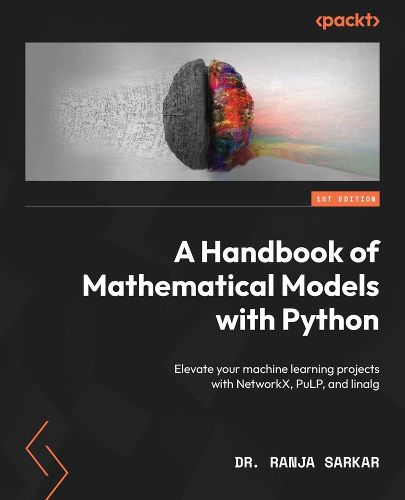Readings Newsletter
Become a Readings Member to make your shopping experience even easier.
Sign in or sign up for free!
You’re not far away from qualifying for FREE standard shipping within Australia
You’ve qualified for FREE standard shipping within Australia
The cart is loading…






This title is printed to order. This book may have been self-published. If so, we cannot guarantee the quality of the content. In the main most books will have gone through the editing process however some may not. We therefore suggest that you be aware of this before ordering this book. If in doubt check either the author or publisher’s details as we are unable to accept any returns unless they are faulty. Please contact us if you have any questions.
Master the art of mathematical modeling through practical examples, use cases, and machine learning techniques
Key Features
Gain a profound understanding of various mathematical models that can be integrated with machine learning Learn how to implement optimization algorithms to tune machine learning models Build optimal solutions for practical use cases Purchase of the print or Kindle book includes a free PDF eBook
Book DescriptionMathematical modeling is the art of transforming a business problem into a well-defined mathematical formulation. Its emphasis on interpretability is particularly crucial when deploying a model to support high-stake decisions in sensitive sectors like pharmaceuticals and healthcare. Through this book, you'll gain a firm grasp of the foundational mathematics underpinning various machine learning algorithms. Equipped with this knowledge, you can modify algorithms to suit your business problem. Starting with the basic theory and concepts of mathematical modeling, you'll explore an array of mathematical tools that will empower you to extract insights and understand the data better, which in turn will aid in making optimal, data-driven decisions. The book allows you to explore mathematical optimization and its wide range of applications, and concludes by highlighting the synergetic value derived from blending mathematical models with machine learning. Ultimately, you'll be able to apply everything you've learned to choose the most fitting methodologies for the business problems you encounter.What you will learn
Understand core concepts of mathematical models and their relevance in solving problems Explore various approaches to modeling and learning using Python Work with tested mathematical tools to gather meaningful insights Blend mathematical modeling with machine learning to find optimal solutions to business problems Optimize ML models built with business data, apply them to understand their impact on the business, and address critical questions Apply mathematical optimization for data-scarce problems where the objective and constraints are known
Who this book is forIf you are a budding data scientist seeking to augment your journey with mathematics, this book is for you. Researchers and R&D scientists will also be able to harness the concepts covered to their full potential. To make the best use of this book, a background in linear algebra, differential equations, basics of statistics, data types, data structures, and numerical algorithms will be useful.
$9.00 standard shipping within Australia
FREE standard shipping within Australia for orders over $100.00
Express & International shipping calculated at checkout
This title is printed to order. This book may have been self-published. If so, we cannot guarantee the quality of the content. In the main most books will have gone through the editing process however some may not. We therefore suggest that you be aware of this before ordering this book. If in doubt check either the author or publisher’s details as we are unable to accept any returns unless they are faulty. Please contact us if you have any questions.
Master the art of mathematical modeling through practical examples, use cases, and machine learning techniques
Key Features
Gain a profound understanding of various mathematical models that can be integrated with machine learning Learn how to implement optimization algorithms to tune machine learning models Build optimal solutions for practical use cases Purchase of the print or Kindle book includes a free PDF eBook
Book DescriptionMathematical modeling is the art of transforming a business problem into a well-defined mathematical formulation. Its emphasis on interpretability is particularly crucial when deploying a model to support high-stake decisions in sensitive sectors like pharmaceuticals and healthcare. Through this book, you'll gain a firm grasp of the foundational mathematics underpinning various machine learning algorithms. Equipped with this knowledge, you can modify algorithms to suit your business problem. Starting with the basic theory and concepts of mathematical modeling, you'll explore an array of mathematical tools that will empower you to extract insights and understand the data better, which in turn will aid in making optimal, data-driven decisions. The book allows you to explore mathematical optimization and its wide range of applications, and concludes by highlighting the synergetic value derived from blending mathematical models with machine learning. Ultimately, you'll be able to apply everything you've learned to choose the most fitting methodologies for the business problems you encounter.What you will learn
Understand core concepts of mathematical models and their relevance in solving problems Explore various approaches to modeling and learning using Python Work with tested mathematical tools to gather meaningful insights Blend mathematical modeling with machine learning to find optimal solutions to business problems Optimize ML models built with business data, apply them to understand their impact on the business, and address critical questions Apply mathematical optimization for data-scarce problems where the objective and constraints are known
Who this book is forIf you are a budding data scientist seeking to augment your journey with mathematics, this book is for you. Researchers and R&D scientists will also be able to harness the concepts covered to their full potential. To make the best use of this book, a background in linear algebra, differential equations, basics of statistics, data types, data structures, and numerical algorithms will be useful.